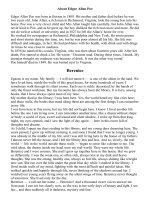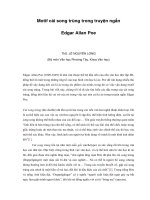The Oval Portrait_Edgar Allan Poe
Bạn đang xem bản rút gọn của tài liệu. Xem và tải ngay bản đầy đủ của tài liệu tại đây (59.45 KB, 3 trang )
About Edgar Allan Poe
Edgar Allan Poe was born in Boston in 1809. His mother and father died before he was
two years old. John Allan, a rich man in Richmond, Virginia, took the young boy into his
home. Poe was a very clever child and Mrs Allan taught him carefully, but John Allan was
never kind to Poe, and as he grew up, the boy disliked the rich man more and more. He did
not do well at school or university and in 1827 he left the Allan's' home for ever.
He worked for newspapers in Richmond, Philadelphia and New York. He wrote poems
and short stories during this time, too, but he was poor almost all his life. His life was
difficult and unhappy, in fact. He had problems with his health, with drink and with drugs.
At times he was close to madness.
In 1836 he married his cousin, Virginia, who was then about fourteen years old. After her
death, Poe started to drink a lot. He wrote: ‘I became mad. During these times, I drank. My
enemies thought my madness was because of drink. It was the other way round.’
Poe himself died in 1849. He was buried next to Virginia.
The Oval Portrait
We saw the dark shape of the roof above the forest. It was not far away, but travelling was
difficult in that wild part of the mountains. We did not arrive until night was falling.
It was a sad and strangely beautiful house, many hundreds of years old. Pedro, my servant,
broke in through a small door at the back and carried me carefully inside. I was so badly
hurt that I would die if we stayed out all night.
"People were living here until a very short time ago," Pedro said. "They left in a hurry."
He carried me through several tall, richly decorated rooms to a smaller room in a corner of
the great house. He helped me to lie down on the bed. There were a lot of a very fine
modern pictures in this room. I looked at them for a while in the dying light. They were
everywhere on the walls, all round me.
After dark, I could not sleep because of pain. Also, I was so weak now that I was afraid
that I was dying. So, I asked Pedro to light the lamp beside the bed.
I began to look at the pictures on the walls, and as I did so I read a small book. I found this
book on the bed next to me. It described all the pictures in the room, one by one, and their
stories.
I looked and read for a long time, and the hours passed quickly. Midnight came and went.
My eyes became more and more tired, and soon I found it hard to read the words on the
page. So I reached out — this was painful and difficult — and moved the lamp closer.
Now, the lamp's light fell in a different part of the room, a part that was in deep shadow
until then. I saw more pictures, and among them there was a portrait of a young woman.
As soon as I saw it, I closed my eyes.
Keeping my eyes closed, I tried to understand why. Why I did suddenly closed my eyes
like that? Then I realized, I did it to give myself time. I needed time to think. Was I sure
that I really saw what I thought I saw? Was I dreaming? No, I was suddenly very awake.
I waited until I was calm again; then I opened my eyes and looked a second time. No,
there was no mistake. My eyes were seeing what they saw the first time, only seconds
before.
The picture, as I said, was a portrait. It was oval in shape, and showed the head and
shoulders of a young woman. It was a finest and the most beautiful painting that I have
ever seen. And I never ever saw a woman as beautiful as her! But it was not her beauty
that shook me so suddenly from my half-sleep. And it was not the beauty of the painter's
work that excited me in such a strange way.
I stayed for perhaps an hours, half-sitting half lying, never taking me eyes off the portrait.
Then a last, I understood. At last, I realized what the true secret of the picture was, and I
fell back in the bed again.
It was the way she was looking at me.
Her eyes, that beautiful smile, that was she look at me — she was so real! It was almost
impossible to believe that she was just pain — that she was not alive!
The first time I looked at the portrait I simply could not believe what my eyes were seeing.
But now I felt a very different feeling growing inside me. The more I looked into those
eyes, the more I looked at that beautiful smile, the more I was afraid! It was a strange,
terrible fear that I could not understand. It was a fear mixed horror.
I moved the lamp back to where it was before. The portrait was now hidden in darkness
again. Quickly, I looked through the book until I found the story of the oval portrait. I read
these words:
"She was a beautiful young flower, and always so happy. Yes, she was happy until that
evil day when she saw and loved the painter of her portrait. They were married. But, sadly,
he already had a wife: his work. His painting was more important to him than anything in
the world.
"Before, she was all light and smiles. She loved everything in the world. Now she loved all
things but one: her husband's work. His painting was her only enemy; and she began to
hate the paintings that kept her husband away from her. And so it was a terrible thing
when he told her that he wanted to paint his young wife's portrait.
"For weeks, she sat in the tall, dark room while he worked. He was a silent man, always
working, always lost in his wild, secret dreams. She sat still — always smiling, never
moving — while he painted her hour after hour, day after day. He did not see that she was
growing weaker with every day. He never notice that she was not healthy any more, and
not happy any more. The change was happening in front of eyes, but he did not see it.
"But she went on smiling. She never stopped smiling because she saw that her husband
(who was now very famous) enjoyed his work so much. He worked day and night,
painting the portrait of the woman he loved. And as he painted, he woman who loved him
grew slowly weaker and sadder.
"Several people saw the half-finished picture. They told the painter how wonderful it was,
speaking softly as he worked. They said the portrait showed how much he loved his
beautiful wife. Silently, she sat in front of her husband and his visitors, hearing and seeing
noting now.
"The work was coming near an end. He did not welcome visitors in the room any more. A
terrible fire was burning inside him now. He was wild, almost mad with his work. His eyes
almost never left the painting now, even to look at his wife's face. Her face was as white as
now. The painter did not see that the colours he was painting were no longer there in her
real face.
"Many more weeks passed until, one day, in the middle of winter, he finished the portrait.
He touched the last paint on to her lips; he put the last, thin line of colour on an eye; then
he stood back and looked at the finished work.
"As he looked, he began to shake. All colour left his face. With his eyes on the portrait, he
cried out to the world: "This woman is not made of paint! She is alive!" Then he turned
suddenly to look at the woman he loved so much...
"She was dead."








![Nghệ thuật xây dựng cốt truyện của Edgar Allan Poe [full]](https://media.store123doc.com/images/document/2015_07/17/medium_nam1437122062.jpg)
